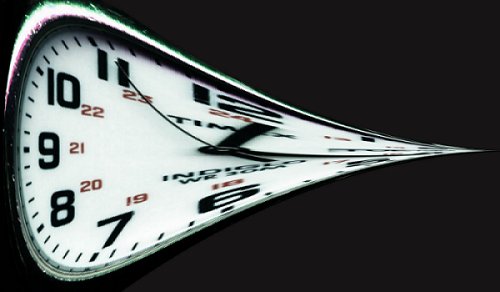Time Travel
Today, we visit yesterday and tomorrow. The University of Houston's College of Engineering presents this series about the machines that make our civilization run, and the people whose ingenuity created them.
I'm ten years old, questioning my father about what's possible and what's not. "How about flying faster than sound," I ask. "Oh, I think that'll happen someday," he replies. Indeed, it did -- just eight years later. "How about a rocket ship to the moon," I wonder. "I think so," he answers, "but not in our lifetimes." Yet we got there 29 years later, with both of us still quite alive.
But this is 1940, and I press on: "Fly faster than light?" He looks at the ceiling, speculatively, "I don't know; I don't think so." Time for the 64-dollar question: "How about a time machine; will we ever travel in time machines?" This time he shakes his head and says, "No, I believe that really is impossible."
My father, a newspaper writer, knew that change was afoot. In 1925, long before anyone had split the atom, he'd done a newspaper editorial on the future of power from nuclear fission. But time travel lay outside even hisspeculations. And, for me, it remains right up there with tooth fairies, world peace and safe cigarettes.
Still, I'm a sucker for a good time-travel yarn. Those stories first took the form of H. G. Wells' The Time Machine. Vehicles we could ride back and forth along time's single track.
Later, people became increasingly aware of paradoxes that might occur if we went back and messed with the past. Twelve years after the conversation with my father, Ray Bradbury played that theme with chilling force in his short story, A Sound of Thunder. In it, tourists visit the past. One accidentally crushes a butterfly -- then returns to a horribly altered present.
My wife and I read and enjoyed a new variation in the book, The The Traveler's Wife. Forget science fiction. Now time travel is a literary device. The woman's life follows linear time. The man's life pops up, out of sequence, in random segments of hers. The story is more about information flow than time travel. Tracing who knows what, and when, makes a tantalizing jigsaw puzzle.
Our latest foray, the movie The Lake House, plays another leitmotif on time travel. What travels now is pure information. The instrument isn't a machine, but a magical mailbox through which letters pass across a two year gap. Critics who view the movie as science fiction hate it. Those who see it as a parable about opportunities missed and claimed, like it a lot.
Maybe that's why I like time travel stories. They remind me that I live either in a deterministic universe, with only one time line, or I can choose opportunities. If I could go back in time with freedom of choice, you and I would never know. That self's choices would return him to a different present -- not so our present.
As writers of time travel stories recognize that fact, they contrive new and more interesting stories, ones that recognize how choice creates a lack of symmetry between past and present. After all, future travel -- that's something we all do, all the time.
I'm John Lienhard, at the University of Houston, where we're interested in the way inventive minds work.
H. G. Wells' book, The Time Machine may be read online at: http://www.online-literature.com/wellshg/timemachine/
Ray Bradbury's story A Sound of Thunder was made into a so-so 2005 movie version that retains only a little of Bradbury's story beyond its title. https://www.imdb.com/title/tt0318081/
For more on the movie, The Lake House, see: https://www.imdb.com/title/tt0410297/
